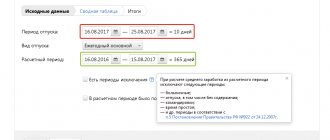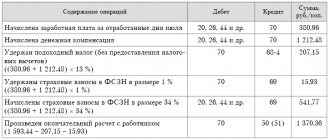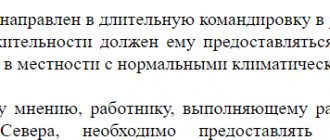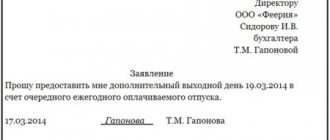Definition and features of provision
The Labor Code does not contain wording of such a concept as leave in advance . But in practice, it is generally accepted that this is rest provided to an employee before the end of the working year.
Keep in mind: granting leave in advance is only possible in relation to annual paid leave! Everything else must be provided on time. Also see “When you can take vacations under the Labor Code.”
The manager is obliged to give his employees basic and/or additional rest every year. During the first working year, a subordinate acquires this right after working out half of the working period. The exceptions are certain categories of citizens:
- minors;
- pregnant employees;
- WWII participants;
- part-time workers;
- raising two or more children;
- other persons.
The conditions for granting leave in advance are distinguished from regular leave by the following characteristics:
Articles on the topic (click to view)
- Fine for late payment of vacation pay
- What to do with unused vacation
- What to do if your employer does not pay vacation pay
- How long after employment is vacation allowed?
- Is maternity leave taken into account when calculating pensions?
- Accounting for compensation for unused vacation
- Dismissal while on maternity leave
- You need to know exactly which periods to include in your work experience.
- Registration of this type of vacation is the right, not the responsibility of the manager.
- Minimum duration – 14 days.
- Replacement with cash payment is not acceptable.
For other categories of employees, rest is provided in proportion to the part of the working year worked with the consent of management. To receive it, a person must submit an appropriate application. The date is determined taking into account the approved schedule. Also see "Vacation Schedule".
Is it possible to take vacation in advance for the next year?
The right to use this type of vacation is granted without restrictions to employees who have worked at least a few days in the new working period. But taking out vacation for the next year is illegal, since the employee has not worked a single day for it!
For employees whose activities are associated with harmful or dangerous environmental factors, registration of basic or additional rest is possible in advance and for its full duration.
Is vacation compensated in advance upon dismissal?
Expert opinion
Novikov Oleg Tarasovich
Legal consultant with 7 years of experience. Specializes in criminal law. Member of the Bar Association.
When an employee arranges a vacation in advance, he subsequently undertakes to work the required number of days. But what to do if the employment contract is terminated? Does the employer have the right to compensate for his losses? The answer to these questions depends on the reason for the dismissal.
The employer does not have the right to demand compensation if the employee took his vacation in advance and was dismissed for the following reasons:
- by agreement of the parties;
- when the employment contract expired;
- transfer to another employer;
- staff reduction;
- refusal to cooperate due to changes in working conditions;
- absence from work for more than 4 months due to temporary incapacity for work (exception – maternity leave);
- referral for training;
- retirement;
- other valid reasons.
If the employment contract is terminated for other reasons, the employer has the right to demand compensation from the employee who took vacation in advance . For example, in case of voluntary dismissal or serious disciplinary offense. It can be deducted without the employee’s consent.
There is a limitation established by Art. 138 of the Labor Code of the Russian Federation: the withheld amount should not exceed 20% of the salary. When vacation pay is transferred in a larger amount or wages are not enough to withhold, you need to negotiate with the employee about the return of the money. He can write a statement of his agreement with the decision being made.
Who can get vacation in advance without permission from management?
There are no restrictions regarding social status, position held, nationality and other distinguishing characteristics as to who has the right to apply to the manager with a request to use vacation ahead of schedule.
At the discretion of management, either a positive decision can be made or an employee can be refused, for example due to production needs.
However, there are exceptions when the employer does not have the right not to provide his subordinates with rest, regardless of how much time has passed since employment.
Upon application, the following are required to take paid vacation days:
- for pregnant women - before taking maternity leave or after its end;
- minors;
- employees who have adopted newborn babies (up to 3 months of age);
- in other situations specified by law.
Some categories of employees have the right to use vacation in advance, regardless of the opinion of management
You don’t need to take it literally that these categories of employees can, when they want, simply not show up for work without telling their superiors. In any case, the employee must write an application addressed to the employer specifying the period when he needs time to rest on account of his annual leave.
Otherwise, the absence of a subordinate may be regarded as absenteeism with the corresponding consequences of disciplinary action up to and including dismissal.
How to take a vacation in advance
The registration is carried out by a personnel specialist or accountant, taking into account the norms of the law. It is imperative to comply with the requirements so that if a disagreement arises, there is documentary evidence of the fact that premature rest was granted.
In the situation under consideration, the procedure follows the standard scheme. The employee writes an application for leave in advance , addressed to the manager. In it he states:
- desired duration – at least 14 days;
- date and your signature;
- the reason that influenced the decision (optional).
EXAMPLE On May 16, 2016, Khrustalev was hired as a leading project manager. After working 19 days, the employee urgently needed leave for family reasons from June 13 for 14 days.
He drew up the following document addressed to the director - an application for early annual leave.
This is important to know: Postponement of leave due to family circumstances
If the employer satisfies the employee’s request and gives leave in advance , an order is issued. The document is filled out according to the unified form T-6. Then both parties sign it. Also see “Sample vacation order”.
Procedure for obtaining leave in advance
If you wish to take paid time off earlier than required by law or scheduled, the employee must write a written application addressed to the manager.
Samples on how to properly submit an application for leave in advance are usually available in the HR department. There are no unified forms.
The application is written randomly by hand or printed using office equipment, making sure to include your signature and date at the end.
Guided by the basic rules of a business letter, be sure to indicate:
- in the upper right part of the sheet - the position of the first manager, surname, initials of the patronymic name (whom they are addressing); the applicant’s position, personal data;
- document's name;
- in the text part the essence of the request is to clarify the timing - when they would like to receive rest days.
Sample application for advance leave
If the employer does not object, the endorsed application is sent to the personnel service, where an order is prepared, a note is made about the granted leave in the personal card and the information is transmitted to the accounting department for accrual of vacation pay.
Funds due must be paid 3 days before the start of the holiday.
Only after you have read and signed the order granting leave can you rest easy.
Providing leave to an employee in advance is formalized by order with signature
As for persons to whom the employer is obliged to provide leave at their request, regardless of length of service or work necessity, we recommend preparing a copy of the application.
Even if the manager does not agree to let the employee go within the period specified by him, you can leave, leaving documentary evidence of your appeal and notice in advance:
- by registering the application with the secretary, asking that the second copy (which will remain with the applicant) be marked with the date of receipt of the application and the incoming number;
- sent by registered mail with return receipt requested to the addressee.
Holiday payment calculation
All amounts due are determined on the basis of average daily earnings and actual time worked. The calculation is carried out in the following order. Also see “Calculating vacation in 2021: examples.”
- We determine the average monthly salary using the formula:
Salary average month – average monthly wage; ZP1, ZP2 – salary for each month of work; N – number of months worked.
We calculate the average daily salary:
ZPsr.d. – average daily salary; 29.3 is the average number of days in one month.
We determine the amount of accrued vacation pay (OTPinit.). It will be equal to:
OTPbeg. = ZPsr.d.x D D – duration of rest (days).
We withhold income tax (13%) from accrued vacation pay:
The amount of cash payments will be:
HOLIDAY PAY = OTPinit. – Personal income tax
Solution.
- Let's calculate the average daily salary using the formula:
Let's determine the amount of accrued vacation pay:
The withheld income tax will be equal to:
13,048 x 13% = 1,696 rubles.
Let’s assume that the vacation provided in advance was used by the employee, and later he quit due to:
- A) conscription for military service;
- B) at your own request.
Can the head of IMICOR-Sibir LLC receive monetary compensation? If yes, then in what size?
Solution.
- A) Conscription for military service This is a valid reason for termination of the contract, and therefore does not serve as a basis for collecting compensation (Part 1 of Article 83 of the Labor Code of the Russian Federation). After Khrustalev’s dismissal, there is no need to demand a refund.
- B) Interruption of cooperation at the initiative of the employee This is the basis for the return of vacation pay. The company must withhold from the last salary an amount to pay off the debt for unworked vacation days in the amount of: 13,048 x 20% = 2,609 rubles.
When providing an employee with leave in advance, there is a risk of losing the money paid. Therefore, when an organization goes to court, it is necessary to prepare reliable and convincing evidence of the illegality of the employee’s position, since the court often takes his side.
In what cases should deductions not be made?
The law prohibits making any deductions if an employee is fired:
- refusing to transfer to the proposed vacancy for health reasons, in accordance with a medical report, or when there are no suitable working conditions;
- in connection with the liquidation of the organization, termination of activities by decision of the owner or recognition of bankruptcy by the court;
- having experienced a reduction in numbers or staff;
- in connection with conscription into the military or assignment to alternative civilian service;
- other cases provided for by the Labor Code of the Russian Federation.
Order a free legal consultation
Who can be given a rest in advance?
The Labor Code does not contain the concept of “vacation in advance,” but Articles 122 and 286 stipulate some cases in which the employer can accommodate and give the employee a rest for the period not yet worked. In particular, Article 122 states that the right to leave arises for a subordinate after 6 months of continuous work with a specific employer.
Expert opinion
Novikov Oleg Tarasovich
Legal consultant with 7 years of experience. Specializes in criminal law. Member of the Bar Association.
In fact, for six months of work, an employee can count on 14 days of rest. But by agreement of the parties, he can be given all 28 days.
In addition, if the employer cooperates, you can receive vacation in advance before the expiration of 6 months. The Labor Code does not exclude this possibility.
Moreover, there are categories of workers who cannot be denied the provision of rest in advance before the expiration of the six-month period:
- workers under 18 years of age;
- pregnant women going on maternity leave or immediately after it;
- who have adopted children under three months of age;
- raising disabled children, etc.
Sample application for advance leave for a pregnant employee
Persons working part-time can also go on vacation for a period not yet worked. According to the rules, such citizens should be granted leave at the same time as at their main place of work. Therefore, even if a part-time worker has not worked the required six months, he has the right to go on vacation during his vacation at his main place.
Other cases of providing advance “vacations” are entirely the responsibility of the employer. The law does not prohibit employers from showing loyalty in this matter, but it is worth remembering the risks in this case.
Dismissal of an employee after an advance vacation
Vacation in advance for the next year carries an obvious danger for the employer. After all, an employee has the right to resign at any time, including while on vacation. In this case, the employer has the right to return money for unworked days from the subordinate’s salary. This is stated in Article 137 of the Labor Code of the Russian Federation. But according to Article 138 of the Labor Code of the Russian Federation, the total amount of deductions cannot exceed 20% of the salary. In most cases, this amount is not enough to cover the resulting losses, so the employer can try to negotiate with the employee on voluntary repayment of the debt.
If an employee refuses to return advance vacation pay, going to court will also not bring a positive resolution to the conflict. Since advance vacation pay is not listed in Article 137 of the Labor Code of the Russian Federation as a basis for the recovery of overpaid funds.
Thus, if the employer was unable to collect a debt from an unscrupulous employee, after a year he has the right to write off this debt as bad.
This is important to know: Is leave without pay included in the length of service?
Risks for the employer
The employee has the right to terminate the employment relationship, regardless of whether it is fixed-term or indefinite, at his own request. In general cases, it is enough to notify the manager at least two weeks in advance.
Thus, by paying in advance for the vacation provided, there is no guarantee that the person will subsequently work the period when he could take it by law.
It is also possible to write a letter of resignation while already on vacation. If there are more than 14 days left before the end of the vacation after submitting the application, the employee will not start work at all. It turns out that vacation funds paid in advance will not be worked out.
The concept of “vacation in advance” and its legislative framework
There is no official term “vacation in advance” in Russian legislation. Annual paid leave, guaranteed to each employee by the Labor Code (Article 122), is earned for 1 working year. It is counted not from the beginning of January, but from the date of registration of the employment contract, that is, it is individual for each employed person.
An employee can go on this leave after completing six months of work experience (the provisions of Article 122 of the Labor Code of the Russian Federation) or earlier, in agreement with the employer. It is not difficult to calculate that during this time, at best, only half of the officially established vacation duration will be worked. It turns out that the second half, if the vacation is not divided into parts, the employee receives in advance.
If the length of service is less than 6 months, then the advance payment of vacation days provided is even longer.
In the second and subsequent years of work, vacation is given according to the schedule at any time; length of service no longer matters, so vacation is often assigned in advance.
FOR YOUR INFORMATION! International Labor Organization Convention No. 132 on Holidays with Paid, which the Russian Federation ratified in 2010, states that an employee can receive leave from any day of his employment for a duration proportional to the time worked. However, many employers give preference to the norms of the Labor Code of the Russian Federation, which are legally “above” the conventional ones. The Labor Code does not deprive the employer of the right to allow early leave, and, regardless of the time worked, it allows you to receive it in full.
Thus, it is possible to define leave provided in advance as annual paid time for legal absence from the workplace, received before the moment of its actual working out.
Vacation before or after another vacation
Motherhood is such a special event in a woman’s life that the state tries in every possible way to protect this category of workers. Women planning maternity leave have the right to go on another vacation, even without having worked for the organization for the required 6 months. Mothers can receive the same leave immediately after leaving maternity leave.
In addition to pregnant women and young mothers, the right to go on leave regardless of length of service is granted to:
- their spouses;
- relatives if they took maternity leave instead of their mother;
- employees who have two young children under the age of 14;
- fathers and mothers of disabled children under 18 years of age.
The law provides the same right, but for reasons not related to parenthood:
- part-time employees who are granted leave from their main job (it must coincide with the rest from their combined position);
- wives or husbands of military personnel who have received their leave (for military spouses, the vacation time must also coincide);
- other categories of employees for whom this right is provided for by the organization’s labor or collective agreement.
When can a vacation be taken earlier than expected?
The law provides for the right to rest for an employee when he retains his workplace and position:
- with maintenance of wages;
- at your own expense.
It is not possible to take rest days in advance when it is:
- student leave, which is issued only upon presentation of documents confirming the call of an employee who combines work with training for classes or to pass a session or pass state exams;
- prenatal and postnatal rest, guaranteed to women at their request if they have a certificate of incapacity for work from the medical institution where they must be registered;
- leave to care for a child under 3 years of age, which can be taken not only by the mother, but also by the father and the child’s working grandparents.
Vacation before dismissal
Before finally leaving the workplace, the employee has the right to “take off” his allotted vacation days. But what if he plans to quit without earning enough experience for a vacation, but nevertheless wants to go on it?
The key point is the employer's consent. If the management does not mind providing the employee with such an opportunity, nothing prevents him from continuing to be listed as an employee of the company during his vacation, having completed the resignation documents on his last working day. However, it should be remembered that before going on vacation, the issue of monetary compensation for vacation not earned by the resigning person must be resolved: it will have to be paid into the cash register voluntarily, or it will be deducted from the salary during the calculation. The employer will not be able to demand this if the employee quits for one of the following reasons:
- consent of the parties (all issues, including payment, are resolved mutually before the order is issued);
- expiration of the employment contract;
- transfer to another place, to another employer;
- changes in working conditions and refusal to cooperate associated with changes;
- sick leave for more than 4 months (except for maternity leave);
- the employee is sent by the company for training;
- the employee was “laid off”;
- the court reinstated the employee who had previously occupied the position of the dismissed person;
- An employee who has rested in advance retires.
NOTE! If an employee leaves voluntarily or quits due to culpable behavior, compensation for unworked but “committed” vacation can be deducted from his salary without asking consent.
Pitfalls of “advance leave” for the employer
It is not surprising that some employers choose not to deviate from their right to provide holiday only on time. There are certain risks in the fact that an employee goes on vacation without earning this opportunity.
The main problem for employers is the possibility of losses due to amounts overpaid for unworked vacation. The manager may face difficulties withholding funds in the event of dismissal of an “over-rested” employee. An employee does not always agree to compensation for vacation pay of his own free will, while it is very difficult to claim this money in court. The law mainly protects the interests of workers, and the regulations provide for a large number of circumstances to which the claim for compensation does not apply, for example:
- the amounts due before dismissal are not enough to cover the debt;
- if the deduction is not made directly upon dismissal, you will have to act through the court or accept the loss of money, the employer has no other legal ways to force the employee;
- the reason for dismissal excludes the possibility of claiming the debt.
This is important to know: How to correctly write an application for rescheduling a vacation
What does the employer risk?
By providing the opportunity to rest early, the management of the enterprise takes a certain risk, since it is impossible to guarantee that the employee will actually work the required days in the future. Labor legislation reserves the right for every citizen to resign on his own initiative at any time, even during the vacation period, if it is used in advance. This measure is enshrined in the provisions of Article 77 and Art. 80 TK.
A situation arises when a person, having taken a vacation in advance and received vacation pay, does not return to the workplace, or returns to work for too short a period, and the employer has already paid the due vacation pay. Upon dismissal, you have to solve the problem of returning money for vacation and collecting overpayments after the accounting department prepares the calculation.
There is a limiting norm of the Labor Code stating that the amount of deductions from the amount earned when taking leave in advance with dismissal should not exceed 20% (see Article 138). If the employee has not worked long, the amount earned will not cover the cost of paid vacation pay. The parties to the employment relationship, on the eve of termination of the contract, must agree on the process of withholding upon dismissal for the leave provided in advance on a voluntary basis, which is not always possible.
When trying to withhold vacation pay paid in advance in court, the employer will face problems, because withholding for overpaid vacation pay is not regulated by the Labor Code. Since the clarifications of the RF Armed Forces speak about the right to return the excess amount paid, without mentioning that the employee is obliged to return part of the vacation pay for unworked time, there is little chance of judicial enforcement.
A debt is generated for the employee who quits, which is then written off as irrevocable, i.e. the debt has to be forgiven, and the company incurs losses.
Retention when not worked
In the process of collecting part of the amount that an employee did not work during leave in advance on the eve of dismissal, significant obstacles arise due to the inconsistency of some legislative norms. The employer has already paid the employee the money and expects that the person will fully work the allotted time, for which he would receive the right to the next annual vacation. But the funds will have to be returned in accordance with Art. 137 of the Labor Code of the Russian Federation, with the registration of retention within the framework of internal document flow - the issuance of an order of dismissal with the addition of a clause on retention.
Sometimes you won't be able to get a refund. Situations when funds can be attributed to the financial losses of the organization resulting from failure to work during dismissal are described in Articles 83, 81 of the Labor Code of the Russian Federation:
- When a company goes into liquidation, the employer's activities cease.
- The company is undergoing a downsizing procedure.
- Referral to emergency service.
- Rehabilitation, reinstatement at work of another person, if such a decision is made by a court or labor inspectorate.
- The employee has become incapacitated and there is a medical report confirming this fact.
- Death of a person.
- Natural disasters, cataclysms, military situations in which the implementation of labor agreements was impossible.
The circumstances described above exempt from the return of compensation for previously paid vacation pay, which leads to financial losses for the enterprise. This should also be taken into account when management decides that such advance leave is appropriate.
If the vacation was given in advance to the employee before the right to use it with the same pay became available, it should be taken into account that this year it will no longer be possible to receive a few more paid days on account of the next vacation. The next vacation period will not begin until next year.
Since the provision of rest days outside the schedule is decided by agreement of the parties, the employer is recommended to carefully evaluate the feasibility of approving the request of a new employee, and the latter should consider whether it is possible to take days in advance if after that he will have to work for a long time without the right to new leave.
Free question to a lawyer
Need some advice? directly on the site. All consultations are free/The quality and completeness of the lawyer’s response depends on how completely and clearly you describe your problem:
“Paper” registration of early leave
It is no different from the traditional one, the sequence of actions remains usual:
- An employee writing a statement.
- Positive endorsement of the application by management.
- Issuing an order to grant leave.
- Accrual of “vacation” funds (the only difference is that they have not yet been earned).
ATTENTION! If the employee has been working for more than a year, then the first point will be preceded by scheduling vacations.
Sample application for leave provided in advance
General Director of Gladiolus LLC Solodovnikov O.S. from storekeeper E.R. Peregudova
I ask you to provide me with another paid leave from 05/20/2017 in the amount of 28 days for the period worked from 02/01/2017 to 05/19/2017.
When does an employee become entitled to leave?
According to Art. 122 of the Labor Code of the Russian Federation, you can go on vacation for the first time for a long period of time (28 calendar days or more for categories of workers with benefits) after six months of working for a specific employer. However, the legislator admits that, by agreement between the employer and the employee, such a decision can be made earlier.
There are categories of employees who can be granted long-term leave from work even before the expiration of six months (they are also listed in Article 122):
- pregnant women (before maternity leave, as well as immediately after it). That is, it doesn’t matter how many months a woman has worked, two or six, she has the right to write a statement before going on maternity leave if there is appropriate evidence of her situation;
- employees under 18 years of age;
- who have adopted a child or several children, if the children are under 3 months old;
- part-time workers (since they are supposed to take a break from work at their main place and at a part-time job);
- men whose wives are on maternity leave.
After working for a year, employees go on vacation at any time in accordance with the schedule. Workers who have worked for a long time can also request leave in advance for the next year, especially since the working year is always determined individually, and the Labor Code does not regulate the procedure for granting subsequent rest periods.
It would be difficult to draw up a schedule, focusing on the exact observance of the deadlines for working the allotted time (working year), therefore, Rules No. 169 of 04/30/1930 (which are still applied now) directly state that when drawing up a schedule, an employee may be granted leave before he has the corresponding right.
The right to take vacation in advance applies only to annual paid leave; other types cannot be provided in advance.
Vacation in advance according to the Labor Code of the Russian Federation: registration, restrictions on provision
Since annual leave is granted on the basis of a pre-agreed vacation schedule, a new employee sometimes requires additional days of rest to account for the fact that the person will work the required number of months in the future.
An agreement arises between the parties to the employment relationship to formalize the absence through leave in advance.
This measure is completely legal and complies with labor legislation, however, there are some restrictions that must be taken into account when providing paid days.
What the law says
This right is established by Article 115 of the Labor Code of the Russian Federation. In fact, 11 months of work at an enterprise allows you to get a legal 4 weeks of freedom from official duties.
However, it is not always possible to wait until the moment when it becomes possible to rest completely all days.
6 months after employment, any employee has the right to apply for paid days.
According to labor legislation, an employee can receive not 14, but 28 calendar days, despite the fact that the year has not yet been fully worked out.
For employees who have worked in the organization for a long period of time, the administration approves the provision of leave in advance and allows them to receive additional days on account of the future period, however, in any case, management decides whether to allow or deny the employee’s request. There are small exceptions to the general rule when days are provided upon a person’s first request.
Who is granted leave in advance?
The company's management must agree on the possibility of the employee leaving, taking into account production needs or for other reasons.
Vacation in advance cannot be realized in the form of monetary compensation, because it is impossible to predict a person’s earnings for a future period.
Advance days can be divided into several parts, however, as in the case of regular leave, the duration of one of these periods must be 14 days or longer.
For some categories of citizens, it is allowed to take leave in advance, and no consent from management is required, even if the work experience with the last employer is less than six months:
- persons under 18 years of age;
- part-time workers;
- if there is a legal spouse who is a military personnel (the leave of both partners is agreed upon for one period);
- adoptive parents, when adopting children under 3 months;
- employees raising 2 or more children under 14 years of age;
- legal representatives of children with disabilities;
- women in the last stages of pregnancy, on the eve of maternity leave, or immediately after the end of its term.
The employer is obliged to provide expectant mothers with a full 28 days, even if they have worked at the enterprise for no more than six months before applying.
Restrictions
When considering the possibility of taking a vacation earlier than the time established by law, it is necessary to understand that no other type of vacation other than regular vacation can be used in advance.
However, in addition to the next vacation, other options are allowed for how to register absence from the workplace in the presence of additional circumstances, such as:
- special working conditions (harmful production, activities hazardous to life and health, work in the Far North) give the right to additional paid time;
- study away from the work process.
When considering the applicability of unscheduled rest, it is important to remember that it is not possible to provide leave in advance for the next working year. The employee is provided with days only within the current year.
There is no provision for double use of the right to 28 calendar days of vacation in advance for the next year while maintaining payment. If an employee takes his vacation in advance, he will no longer be able to rest this year.
How to register and take into account
Registration is carried out in full accordance with the general rules: first, the worker writes an application (if there is a schedule, this is not necessary), receives an employer visa, an order is drawn up, and appropriate deductions are made. The benefit is also calculated according to general rules, based on the established amount of average monthly earnings. And it is paid in full for all days provided, regardless of how many days of rest the employee is entitled to, in proportion to the actual time worked in the organization. Appropriate notes are made in the work schedule and time sheet.
How to calculate the payment?
Vacation pay for this type of vacation is calculated in approximately the same way as for a planned vacation.
Kurova K.A. I asked for 18 days of rest in advance, so vacation pay will be calculated only for this period of time.
Calculation order:
- Average monthly salary = (Site1+Site2+…+Site12)/12 = 306,000/12 = 25,500 rubles.
- Average daily salary = Average monthly salary/29.3 = 25,500/29.3 = 870 rubles.
- Vacation pay for 18 days. (without deduction of payroll) = Average daily salary × 18 days = 870 × 18 = 15,660 rubles.
- Income tax = 15,660×13% = 2,036 rubles.
- Vacation pay for 18 days = 15,660-2,036 = 13,624 rubles.
Explanation:
- 29.3 – average number of days in a month.
- PI – income tax.
Based on calculations, Kurova K.A. will receive 13,624 rubles for 18 days of his vacation.









